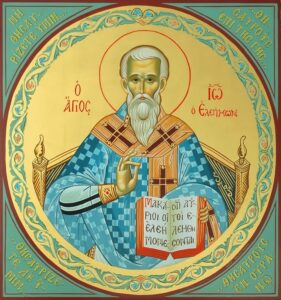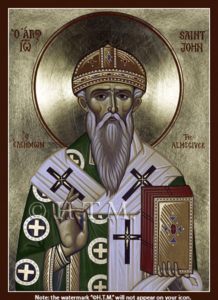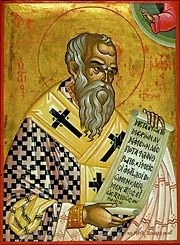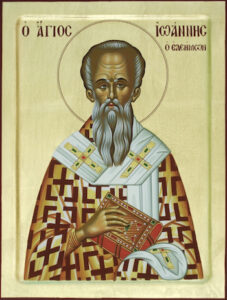St John the Merciful, Patriarch of Alexandria – Nov 12 I The Compassionate Almsgiver

St John the Merciful, the Compassionate, Patriarch of Alexandria, was born in Amathus of Cyprus, to Epiphanius, the governor of the Island, in about 550. The family of the illustrious dignitary Epiphanius. At the wish of his parents, he entered into marriage and had children. When the wife and the children of the saint died, he was called by the then Patriarch of Alexander, recommended by a friend perfect Niketas. He was zealous in fasting and prayer, and had great love for those around him. He entered the religious life and became a monk.
His spiritual exploits won him honor and praise among men. He was highly revered and held in high esteem by the emperor and people alike. When the Patriarchal throne of Alexandria was vacant, as Patriarch Theodore passed away, the emperor Heraclius, all the clergy and the Alexandrians begged Saint John to occupy the Patriarchal throne. He was appointed as Patriarch of Alexandria, 608/611. He gained his epithet title from his many philanthropic and benevolent labors and his unstinting generosity in distributing the vast wealth of the patriarchate of Alexandria to the poor and afflicted. St John worthily assumed his arch pastoral service, concerning himself with the moral and dogmatic welfare of his flock, he denouncing every soul-destroying heresy, and drove out from Alexandria the Monophysite Phyllonos of Antioch. St John was a man of exemplary uprightness; he strove to mightily fight many heresies among Christians in Egypt. St. John took care of spiritual and bodily needs and nourishment and in dinners and other gatherings in the patriarchal palace, he would only converse on the Scriptures or other spiritual topics.

On assuming his office, his first act was that he asked the officers to make a list of the ‘Masters’ in the city. They made a list of the rich and the affluent and presented to Him. He told that by ‘masters’, he meant the ‘the poor and underprivileged’. Thus, the officers made a list of poor people that and their number amounted in thousands. His first act was to distribute about 80, 000 pieces of gold, which he found in the treasury of his church to the hospitals, monasteries and poor. He said “those whom you call as poor and beggars, I proclaim these as my masters and helpers, for they and only they are able to help us and bestow upon the kingdom of heaven”.

The same day he passed strict ordinances to use just ‘weight and measures’ in order to prevent injustices and oppressions of the poor. He was strict with his officers and servants receiving any gifts and presents, as that amount to bribe and bias. In one incident in his life, he felt highly remorseful for accepting a richly-embroidered blanket as a gift. He could sleep until he sold it and gave the proceeds to the poor. He also made himself available to anyone who had a petition, grievance, or request. He, consecrated the great revenues of his See, to the service of the poor. The poor were always under his special protections, whom he furnished with all their needs and necessities.
It is said that St. John had a dream in his youth days, he saw a beautiful maiden with a garland of olives on her head, who said that she was “Compassion”, the eldest daughter of the Great King. This dream influenced him immensely and made a deep impression on him. He became known for generosity and goodness, hospitality and humility, sympathy and servitude for the poor and downtrodden.
He never spared any opportunity of helping the needy even on a large scale. He soon became known all over the East for his help towards the poor. St John, the Almsgiver ordered that all of these unfortunates be provided for each day out of the Church’s treasury. His care and compassion were not limited to his own flock in Alexandria, but extended to the people of Palestine in their sufferings during the Persian invasion of Jerusalem. John sent convoys of essential supplies to Palestine and welcomed many refugees to Alexandria. His acts of mercy were so great and pronounced that even the Persian invaders of Jerusalem, desired to see him. He persevered in prayers without ceasing and loved the impoverished and satisfied them. His riches and wealth he dispersed to the poor and received the Heavens’ riches in return. He was true shepherd in Christ and imitator of Christ.
St John was once persuaded to accompany the governor Nicetas on a visit to the emperor in Constantinople. Enroute his way to visit the earthly king, he dreamed of a resplendent man who said to him, “The King of Kings summons you.” He sailed to his native island of Cyprus, and at Amanthus, he peacefully fell asleep in the Lord, at the age of 64, in 619. After Saint John entered the eternal Kingdom of his Lord, his wonderworking and incorrupt relics were translated to Constantinople, then to Budapest and Presburg, and finally settled in Venice. St John is commemorated in the Orthodox Church on November 12.


0 Comments